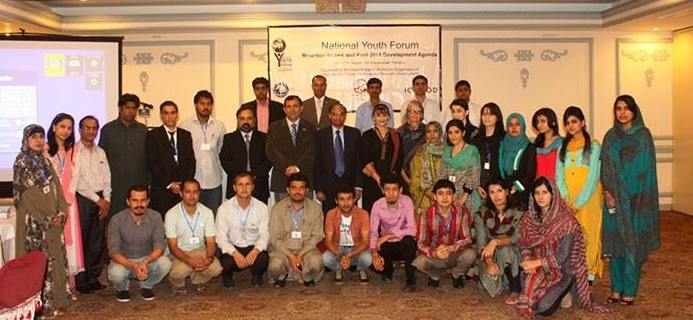"Environmental challenges originate in the mountains"
November 15th, 2013 Few of Pakistan’s urban dwellers are aware of the connection between the nation’s extensive mountain ranges and the environment, writes Faheem Bin Tariq, a Correspondent from Karachi, Pakistan, but a dedicated network of youth is putting mountain conservation and education on the agenda.
Few of Pakistan’s urban dwellers are aware of the connection between the nation’s extensive mountain ranges and the environment, writes Faheem Bin Tariq, a Correspondent from Karachi, Pakistan, but a dedicated network of youth is putting mountain conservation and education on the agenda.
In Pakistan, we find huge mountain ranges in the Northern and North-Western parts, which includes the Himalayan, Karakoram and Waziristan ranges.
It is worth stating that mountainous region in Pakistan face extreme weather conditions, which causes inhabitants to migrate in winters. In summers, for scenic beauty and natural eco-system, these mountains are of great interest to tourists from around the world.
In Islamabad, the capital city of Pakistan, a Youth Forum on Mountain Issues and Post 2015 Development agenda recently attracted 30 young people representing youth populations in different parts of Pakistan to discuss mountain-related issues.
The coming of tourists to any country is always a blessing, but unfortunately un-organized tourism activities result in contamination of the environment in the peaks of these mountains. That makes the flowing water a hazard for the rest of the country’s population living in the plains and delta regions. The core team of Asia-Pacific Youth Task Force (APYTF) on Climatic Issues wanted to engage young people on solving environmental challenges that originate in the mountains of Pakistan.
The big achievement of the forum was that despite discrete diversity and differences, all participants came together on a single draft resolution to deliberate their collective voice on a sustainable and greener future. The three-day long program contained capacity building and knowledge exchange sessions, leadership exercises, discussions and excursions to nearby environmental projects in twin cities of Islamabad and Rawalpindi.
In excursions, participants were given practical exposure to technologies for sustainable development including, bio-gas generation, solar cooking and composting machinery, and visited the National Bio-Diversity Park of Pakistan.
A few questions that were the center of dialogue and discussions included:
- What hinders the youth involvement in sustainable initiatives in mountains, and how do we (young people) want to overcome them?
- What can be the best methods to ensure youth influence in conservation of mountains?
- How can a prosperous future for young people living in mountainous areas be advocated?
Some of the facilitators who helped participants understand policy aspects and general knowledge on climatic issues included Samera Zaib (Volunteer, APYTF), Aisha Khan (C.E.O. of Mountain and Glacier Protection Organization), Anja Møller Rasmussen (Senior Manager, ICIMOD), and Dr. Qamaruz Zaman (Advisor, Lead Pakistan).
The initial version of the draft focused on the following agenda:
- Betterment of socio-environmental issues begins with economic wellbeing of people; therefore young people should be supported in eco-friendly ways of earning a living by micro-financing schemes
- Young people are quite unaware of mountains, their geography and their importance with respect to inhabiting bio-diversity and tourism, therefore concrete measures should be taken to bring such information/knowledge in high school curricula.
- There should be development of virtual forums for the young people of Pakistan to learn and research more about mountains, sustainability and bio-diversity in Pakistan.
- Database events relevant to climate change in Pakistan to keep the young people engaged is urgently required at this time. It will help in nurturing a great environmentalist mindset in Pakistan.
- At grass-roots levels, with support of Union and District Councils, community-based interaction between young people and stakeholder on climatic issues, including floods, earthquakes, mitigation and green economy should be facilitated.
Young participants enthusiastically declared the formation of community-based environmentalism groups in Baluchistan, FATA, Gilgit-Baltistan and Potawar Region of Pakistan to conserve nature. Further, ICIMOD – one of the sponsors of the forum – will be presenting the recommendations of this forum to UNFCC COP-19 happening in Warsaw, Poland.
Photo: Faheem Bin Tariq
…………………………………………………………………………………………………………………
About me: I am a youth activist and leadership facilitator who believes in the power in youth. With a mission to empower youth, I have impacted lives of at least two million young people across Pakistan. I am currently pursuing a Bachelors degree with dual majors in Architecture and Planning.
I was the British Council’s Global Changemaker (2012-13) and served as UNESCO Youth Peace Ambassador (2011-12).
…………………………………………………………………………………………………………………
Opinions expressed in this article are those of the author and do not necessarily represent the views of the Commonwealth Youth Programme. Articles are published in a spirit of dialogue, respect and understanding. If you disagree, why not submit a response?
To learn more about becoming a Commonwealth Correspondent please visit: http://www.yourcommonwealth.org/submit-articles/commonwealthcorrespondents/
…………………………………………………………………………………………………………………




